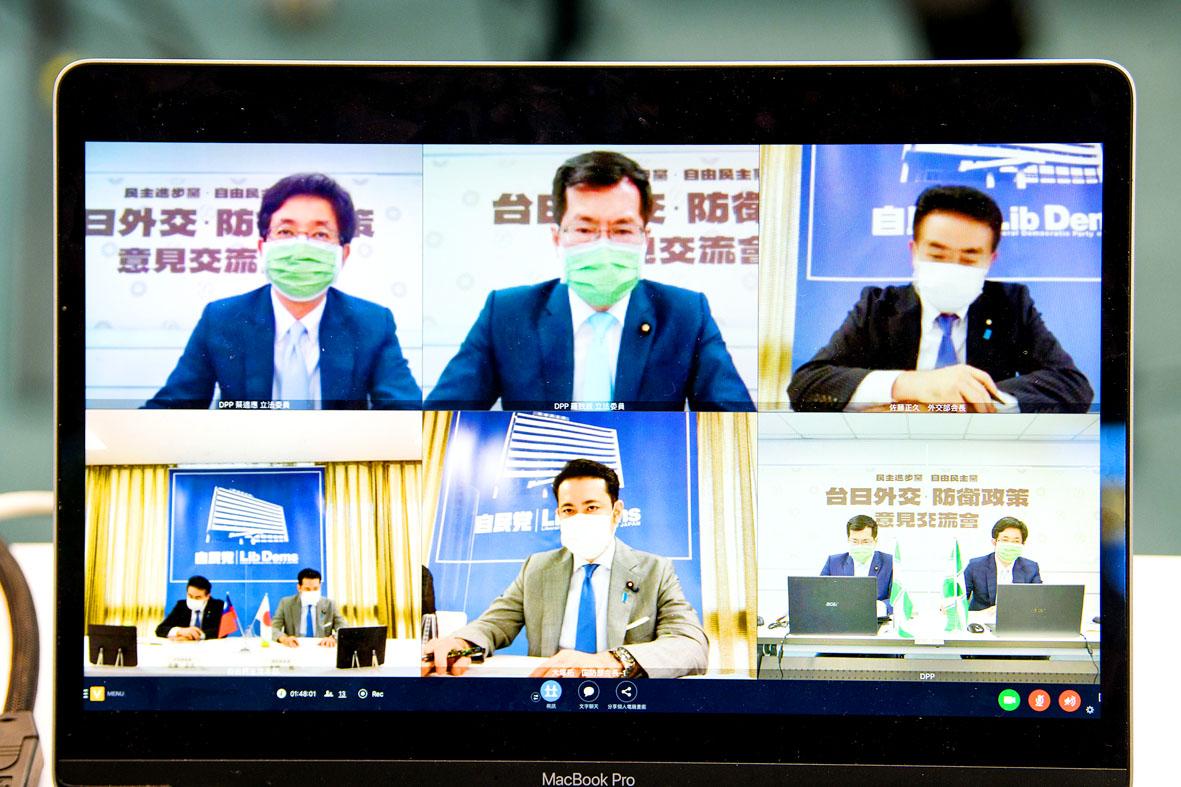The ruling parties of Taiwan and Japan yesterday held their first diplomatic and defense policy discussion, with representatives of Japan’s Liberal Democratic Party (LDP) pledging to support Taiwan’s bid to join the Comprehensive and Progressive Agreement for Trans-Pacific Partnership (CPTPP).
The 90-minute videoconference was attended by Lo Chih-cheng (羅致政) and Tsai Shih-ying (蔡適應) of the Democratic Progressive Party (DPP), with LDP Foreign Affairs division director Masahisa Sato and National Defense division director Taku Otsuka, DPP spokeswoman Hsieh Pei-fen (謝佩芬) said after the meeting.
The Japanese representatives asked Taipei to facilitate an investment by the Taiwanese semiconductor industry — especially Taiwan Semiconductor Manufacturing Co (台積電) — into the Japanese chip industry, Lo said.

Photo courtesy of the Democratic Progressive Party
The LDP representatives also pledged to back Taiwan’s bid to enter the CPTPP, as its participation in the organization is an important goal for Taiwan and regional partners, and would improve Taiwan-Japan relations, Lo said.
Both sides mentioned their concern over the presence of Chinese military vessels and aircraft in Japan’s southwestern and Taiwan’s northeastern sea zones, Tsai said.
Japan said it would invest a significant sum of the next fiscal year’s defense budget to bolster its air superiority in the region, while Taiwan said it would seek to increase its defense and take measures to secure its northeastern front, he said.
Both sides discussed military cooperation, which each said they would forward to their respective defense ministries, he said, adding that he could not comment on the specifics of the dialogue.
They also discussed the US’ resolve to support Taiwan’s defense, Lo added.
The party representatives also agreed to promote coast guard collaborations, Tsai said, adding that just before the meeting started, Sato wrote on Twitter, in Japanese, that “one day, the coast guards of Japan, Taiwan and the US will conduct joint training.”
While the issue of vaccines had not been brought up, Lo said that he had thanked the LDP and the Japanese government for donating vaccines to Taiwan, adding that it would deepen bilateral ties.
The Japan side said that its House of Councilors, the upper house of Japan’s Diet, in June introduced a motion to support Taiwan’s participation in the WHO as an observer.
In a separate comment to reporters after the meeting, Lo said that developing better Taiwan-Japan relations is backed by strong public support.
International affairs are changing, as many nations begin to express doubts about China, and Beijing’s bellicose attitude and military ambitions were among the many issues that led to the meeting, Lo said.
Sato said the dialogue would help inform the Japanese ruling party’s policymaking.
“The Taiwanese side said they had been waiting and hoping for such a dialogue ... [we both] felt it was significant to come up with common goals between the ruling parties that can lead to government policy for both countries,” Sato said.
China last week condemned the talks, saying that Japan should not send the “wrong signals” about Taiwan’s independence.
Lo brushed off China’s objections, saying it was expected.
“Taiwan, as a sovereign and independent country, has the right to promote bilateral and multilateral ties with all countries,” he said.
Additional reporting by Reuters and CNA

MAKING WAVES: China’s maritime militia could become a nontraditional threat in war, clogging up shipping lanes to prevent US or Japanese intervention, a report said About 1,900 Chinese ships flying flags of convenience and fishing vessels that participated in China’s military exercises around Taiwan last month and in January last year have been listed for monitoring, Coast Guard Administration (CGA) Deputy Director-General Hsieh Ching-chin (謝慶欽) said yesterday. Following amendments to the Commercial Port Act (商港法) and the Law of Ships (船舶法) last month, the CGA can designate possible berthing areas or deny ports of call for vessels suspected of loitering around areas where undersea cables can be accessed, Oceans Affairs Council Minister Kuan Bi-ling (管碧玲) said. The list of suspected ships, originally 300, had risen to about

DAREDEVIL: Honnold said it had always been a dream of his to climb Taipei 101, while a Netflix producer said the skyscraper was ‘a real icon of this country’ US climber Alex Honnold yesterday took on Taiwan’s tallest building, becoming the first person to scale Taipei 101 without a rope, harness or safety net. Hundreds of spectators gathered at the base of the 101-story skyscraper to watch Honnold, 40, embark on his daredevil feat, which was also broadcast live on Netflix. Dressed in a red T-shirt and yellow custom-made climbing shoes, Honnold swiftly moved up the southeast face of the glass and steel building. At one point, he stepped onto a platform midway up to wave down at fans and onlookers who were taking photos. People watching from inside

Japan’s strategic alliance with the US would collapse if Tokyo were to turn away from a conflict in Taiwan, Japanese Prime Minister Sanae Takaichi said yesterday, but distanced herself from previous comments that suggested a possible military response in such an event. Takaichi expressed her latest views on a nationally broadcast TV program late on Monday, where an opposition party leader criticized her for igniting tensions with China with the earlier remarks. Ties between Japan and China have sunk to the worst level in years after Takaichi said in November that a hypothetical Chinese attack on Taiwan could bring about a Japanese

The WHO ignored early COVID-19 warnings from Taiwan, US Deputy Secretary of Health and Human Services Jim O’Neill said on Friday, as part of justification for Washington withdrawing from the global health body. US Secretary of State Marco Rubio on Thursday said that the US was pulling out of the UN agency, as it failed to fulfill its responsibilities during the COVID-19 pandemic. The WHO “ignored early COVID warnings from Taiwan in 2019 by pretending Taiwan did not exist, O’Neill wrote on X on Friday, Taiwan time. “It ignored rigorous science and promoted lockdowns.” The US will “continue international coordination on infectious